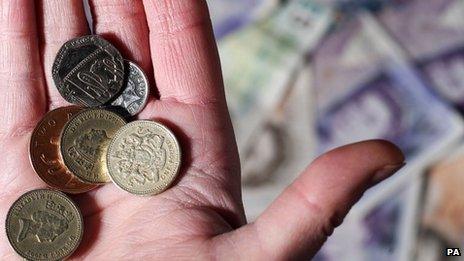Minimum wage - whatever happened to £7 an hour?
- Published

The Low Pay Commission has proposed increasing the minimum wage to £6.50 an hour from October - an above inflation increase of 3%.
It's a recommendation ministers look certain to accept.
But hold on, some are saying, that's lower than the £7 the chancellor talked of when I interviewed him last month.
It is proof Labour say that George Osborne was guilty of "misleading and empty rhetoric".
This is what the Chancellor said to me in January.
"The exact figure has to be set by the Low Pay Commission which talks to business, talks to other bodies in our economy, but if, for example, the minimum wage had kept pace with inflation, it would be £7 by 2015-16".
So, he didn't recommend the £7 figure but clearly hinted that he wanted it reached by the time of the next election.
The Low Pay Commission made no such promise today but it did say that:
George Osborne: "I want to make sure the working poor benefit. I want to make sure we are all in this together"
"Provided the economy continues to improve we expect to recommend further progressive real increases in the value of the minimum wage, restoring and then surpassing its previous highest level, so that 2014 will mark the start of a new phase - of bigger increases than in recent years - in the work of the Commission."
There will be another rise announced before the election but it is unlikely to take the minimum wage as high as £7 and, what's more, it won't be implemented until after polling day.
George Osborne's aides insist that he helped convince the Low Pay Commission to raise the minimum wage further than they would otherwise have done - delivering the first above inflation increase since 2008.
His opponents say he was spinning and raised expectations which he failed to deliver on.